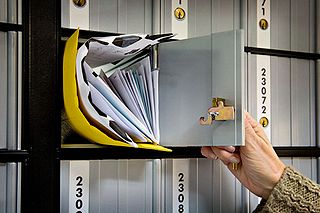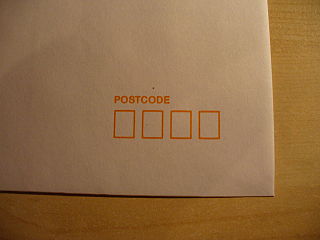Telecommunications in Sierra Leone include radio, television, fixed and mobile telephones, and the Internet.

The United States Postal Service (USPS), also known as the Post Office, U.S. Mail, or Postal Service, is an independent agency of the executive branch of the United States federal government responsible for providing postal service in the U.S., including its insular areas and associated states. It is one of the few government agencies explicitly authorized by the Constitution of the United States. The USPS, as of 2021, has 516,636 career employees and 136,531 non-career employees.

A ZIP Code is a system of postal codes used by the United States Postal Service (USPS). Introduced on July 1, 1963, the basic format consisted of five digits. In 1983, an extended ZIP+4 code was introduced; it included the five digits of the ZIP Code, followed by a hyphen and four digits that designated a more specific location.

Postal codes used in the United Kingdom, British Overseas Territories and Crown dependencies are known as postcodes. They are alphanumeric and were adopted nationally between 11 October 1959 and 1974, having been devised by the General Post Office. A full postcode is known as a "postcode unit" and designates an area with several addresses or a single major delivery point.

Nadi is the third-largest conurbation in Fiji. It is located on the western side of the main island of Viti Levu, and had a population of 42,284 at the most recent census, in 2007. A 2012 estimate showed that the population had grown to over 50,000. Nadi is multiracial with many of its inhabitants Asians, Indian or Indigenous Fijians, along with a large transient population of foreign tourists. Along with sugar cane production, tourism is a mainstay of the local economy.
Poste restante, also known as general delivery in North American English, is a service where the post office holds the mail until the recipient calls for it. It is a common destination for mail for people who are visiting a particular location and have no need, or no way, of having mail delivered directly to their place of residence at that time.
Postcodes in New Zealand consist of four digits, the first two of which specify the area, the third the type of delivery, and the last the specific lobby, RD number, or suburb. The present postcode system was introduced in New Zealand in June 2006, which, unlike the previous system, applies to all items of mail with effect from June 2008. In October 2008, New Zealand Post launched a 'remember your postcode' campaign, offering a NZ$10,000 prize for remembering a postcode.
Postal codes were introduced in South Africa on 8 October 1973, with the introduction of automated sorting.

A post office box is a uniquely addressable lockable box located on the premises of a post office.

A letter box, letterbox, letter plate, letter hole, mail slot or mailbox is a receptacle for receiving incoming mail at a private residence or business. For outgoing mail, Post boxes are often used for depositing the mail for collection, although some letter boxes are also capable of holding outgoing mail for a carrier to pick up. Letterboxes or mailboxes use the following primary designs:
An address is a collection of information, presented in a mostly fixed format, used to give the location of a building, apartment, or other structure or a plot of land, generally using political boundaries and street names as references, along with other identifiers such as house or apartment numbers and organization name. Some addresses also contain special codes, such as a postal code, to make identification easier and aid in the routing of mail.
A suite is the location of a business within a shopping mall or office building. The suite's number also serves as a sort of address within an address for purposes of mail delivery and pickup.
Within the United States, a commercial mail receiving agency (CMRA) is a private business that accepts mail from the Postal Service on behalf of third parties. A CMRA may also be known as a mail drop. A mailbox at a CMRA is called a private mailbox (PMB).

Singapore Post Limited, commonly abbreviated as SingPost, is an associate company of Singtel and Singapore's designated Public Postal Licensee which provides domestic and international postal services.

Freepost is a postal service provided by various postal administrations, whereby a person sends mail without affixing postage, and the recipient pays the postage when collecting the mail. Freepost differs from self-addressed stamped envelopes, courtesy reply mail, and metered reply mail in that the recipient of the freepost pays only for those items that are actually received, rather than for all that are distributed. Freepost of preprinted cards issued by businesses is also different from postal stationery sold by postal administrations.

Nadi International Airport is the main international airport of Fiji as well as an important regional hub for the South Pacific islands, located by the coast on the Ba Province in the Western Division of the main island Viti Levu. Owned and operated by Fiji Airports Limited, it is the main hub of Fiji Airways and its domestic and regional subsidiary Fiji Link. The airport is located at Namaka, 10 km from the city of Nadi and 20 km from the city of Lautoka. In 2019, it handled 2,485,319 passengers on international and domestic flights. It handles about 97% of international visitors to Fiji, of whom 86% are tourists. Despite being Fiji's main airport, it is a considerable distance from the country's major population centre; it is located 192 kilometres (119 mi) northwest of the country's capital and largest city Suva and its own airport, Nausori International Airport.

Postcodes in Australia are used to more efficiently sort and route mail within the Australian postal system. Postcodes in Australia have four digits and are placed at the end of the Australian address, before the country. Postcodes were introduced in Australia in 1967 by the Postmaster-General's Department and are now managed by Australia Post, Australia's national postal service. Postcodes are published in booklets available from post offices or online from the Australia Post website.
After 28 years without a postal code system in Namibia, the national postal service provider NamPost introduced new postal codes in December 2018.

This article documents the chronology of the response to the COVID-19 pandemic in November 2021, which originated in Wuhan, China in December 2019. Some developments may become known or fully understood only in retrospect. Reporting on this pandemic began in December 2019.